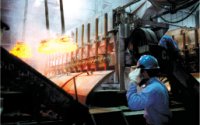forum
library
tutorial
contact

Industry Needs
Reasonable Pollution Rules
by Editorial Board
Spokesman-Review, November 6, 2015
|
the film forum library tutorial contact |

|
Industry Needs
by Editorial Board
|
 The Kaiser Aluminum Mead smelter was shuttered more than a decade ago, eliminating about 800 jobs, but news that Alcoa will idle its two Washington smelters still resonates.
The Kaiser Aluminum Mead smelter was shuttered more than a decade ago, eliminating about 800 jobs, but news that Alcoa will idle its two Washington smelters still resonates.
The Ferndale and East Wenatchee plants were the last of 10 -- seven in Washington -- that at one time smelted 40 percent of all the aluminum produced in the United States.
Thousands of highly paid workers have lost their jobs, and small communities such as Goldendale, Washington, and Columbia Falls, Montana, an economic mainstay.
The Spokane area is fortunate that Kaiser's Trentwood rolling mill has remained vital by specializing its product mix. But now there's a shadow over that plant: rule-making that will tighten air pollution standards in Washington.
The Spokane Waste-to-Energy Plant and Avista, as the area's natural gas distributor, are also among the 35 facilities that could be affected by a rewrite of state air pollution rules that is a priority of Gov. Jay Inslee.
The Legislature rejected his cap-and-trade proposal, but an initiative that would impose a carbon tax may well be on the 2016 ballot, and competing measures also addressing air quality may go before voters as well.
As the worthwhile discussion about those various ideas goes forward, it would also be good to consider what brought about the demise, hopefully temporary, of Alcoa's smelters, including a third one in northern New York state.
Aluminum prices have fallen 30 percent in the past year, more than 7 percent in just the past month. Like other metals, aluminum has suffered from declining demand, particularly from China.
But it is also China that is being blamed for an oversupply of the metal. In July, exports were up 35 percent year-over-year, and U.S. companies alleged the Chinese were dumping surplus production.
What they are also dumping is more air pollution.
Aluminum smelting consumes a lot of electricity. The industry moved to the Northwest back when Columbia River dams were generating a surplus and prices were extremely low. When prices spiked during the region's 2000-2001 energy crisis, smelter after smelter closed -- including Mead -- never to reopen.
Meanwhile, coal-fired generating plants in Centralia and Boardman, Oregon, are scheduled to close because retrofitting to control emissions would be too expensive.
That's not a problem in China, which continues to rely on coal -- and lie about how much it uses, to boot.
Closing U.S. smelters simply transfers production to countries like China where emissions are a far lower priority than in Washington.
Concerns about lower standards for pollution controls and worker safety account for much of the opposition to the proposed Trans-Pacific Partnership, an agreement that on balance is good for Washington.
Saturday morning, representatives from the Department of Ecology, Kaiser, the United Steelworkers and other labor representatives will discuss the tradeoffs involved in the air pollution rule-making at a town hall meeting in the Local 338 union hall at 14015 E. Trent Ave.
The outcome should be one that preserves as many manufacturing jobs as possible.
learn more on topics covered in the film
see the video
read the script
learn the songs
discussion forum
